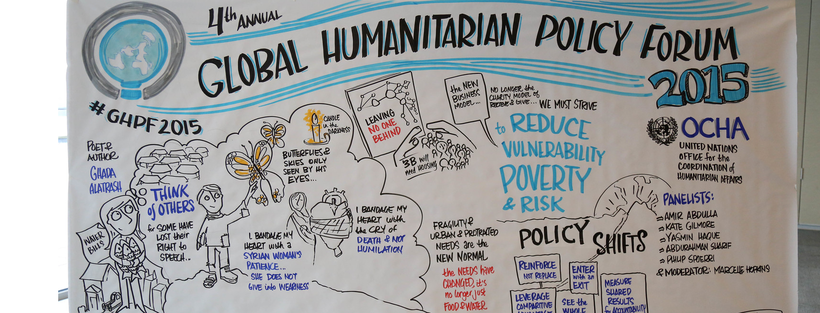Global Humanitarian Policy Forum 2015

- Start date:
- End date:
New York
OCHA’s fourth annual Global Humanitarian Policy Forum took place 1-2 December 2015 in New York, with the participation of more than 100 representatives of agencies, NGOs, think tanks, universities, the private sector and Governments from around the world. Organized by OCHA’s Policy Analysis and Innovation Section, within the Policy Development and Studies Branch, the 2015 GHPF saw the launch of OCHA’s newest policy study, “Leaving No One Behind: Humanitarian effectiveness in the age of the Sustainable Development Goals,” followed by two days of workshops addressing key issues and potential solutions to those challenges. With over thirty nationalities represented, and more than half of the participants being women, the Forum benefited from diverse voices and rich expertise. More than 500 viewers also tuned into the discussion online – an archive is available here.
The Forum opened with a panel discussion including the following speakers:
- Amir Abdulla, Deputy Executive Director, World Food Programme
- Kate Gilmore, Deputy Executive Director, UN Population Fund1
- Yasmin Haque, UNICEF, Deputy-Director, Office of Emergency Operations
- Abdurahman Sharif, Director, Somalia NGO Consortium
- Philip Spoerri, ICRC Permanent Observer to the UN
- Marcelle Hopkins, Journalist (moderator)
Panellists offered their perspectives on the applicability of the five shifts within the humanitarian effectiveness study: “reinforce, don’t replace existing capacities and coping strategies”; “enter with an exit: collaborate to reduce and end humanitarian need”; “leverage comparative advantage: strengthen connectivity and strategic leadership”; “see the whole picture: 360-degrees of needs and risk”; and “measure shared results for collective accountability.” Panellists provided a resounding endorsement the study’s direction and a snap poll taken during the discussion revealed that participants viewed “reinforce, don’t replace” and “see the whole picture” as the most important changes for the humanitarian sector to undertake.
Workshop and Outcomes
Workshops were designed to foster discussion around how humanitarians can incorporate the SDGs into their work, and which partners or tools are available to overcome challenges. Presentations were made by various stakeholders from the UN, private sector, academia, local and international NGOs, and others, with workshops addressing political solutions to humanitarian crises, internal displacement, risk, financing, innovation, and broadly, “new ways of working”. Some of the top conclusions included the following:
- Humanitarians cannot substitute for political solutions as protracted crises proliferate.
- Promote shared analysis with those outside of the humanitarian system, including understanding context and incentives for action.
- Overcome humanitarian and development siloes, including joint planning and flexible funding between humanitarian and development actors to ensure shared results.
- Create a cross-sector alliance that promotes coordination and standards within the humanitarian innovation sector.
- Ensure the formation of partnerships between business, Governments, humanitarian, and development actors, including those at the local level.
- Ensure dedicated resources for preparedness, particularly support for local civil society capacity.
- Address the structural causes of gender exclusion.
- Adopt area and system based approaches to humanitarian response.
The Forum closed on 2 December with a briefing by the World Humanitarian Summit Chief, Antoine Gerard, and OCHA’s Policy Chief, Hansjoerg Strohmeyer, who offered their thoughts on the utility of discussions around adapting to the enormity of today’s crises and the need for people-centered, multi-stakeholder approaches, the urgency of reducing needs is evident. Forum participants then shared their workshop recommendations, debating the merits and considering potential challenges with an informal panel sharing their reactions to the Forum’s findings.
A full analytical report of the 2015 Global Humanitarian Policy Forum will be available in early 2016. A summary note is available here.
In the meantime, we encourage you to visit unocha.org/humanity360 for an interactive look at both the effectiveness study and 2015 World Humanitarian Data and Trends.
